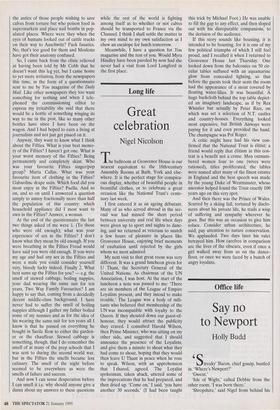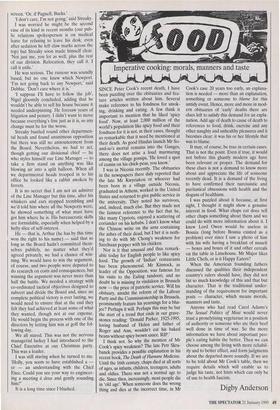Office life
Say no to Newport
Holly Budd
cs Creaky' Bacon, chief gossip, bustled in. 'Where's Newport?'
`Gwent.'
`Isle of Wight,' called Debbie from the other room. 'I was born there.'
`Shropshire,' said Nigel from behind his screen. 'Or, if Pagnell, Bucks.'
'I don't care, I'm not going,' said Streaky. I was worried he might be the second case of its kind in recent months (our pub- lic relations spokesperson is on medical leave for refusing to leave his desk; even after sedation he left claw marks across the top) but Streaky soon made himself clear. `Not just me, you lot as well, plus the rest of our division. Relocation, they call it. I call it exile.'
He was serious. The rumour was soundly based, but no one knew which Newport. `I'm not going back to any Newport,' said Debbie. 'Don't care where it is.'
`I suppose I'll have to follow the job', Nigel gloomily concluded, adding that he wouldn't be able to sell his house because it needed underpinning. He foresaw years of litigation and penury. I didn't want to move because everything's fine just as it is, so any change must be for the worse.
Streaky bustled round other departmen- tal heads and found unanimous opposition but there was still no announcement from the Board. Nevertheless, we had to act, though getting our divisional chief — he who styles himself our Line Manager — to take a firm stand on anything was like blowing air into a split balloon. When all we departmental heads trooped in to his office he looked like a rabbit awoken by ferrets.
It is no secret that I am not an admirer of the Line Manager but this time, after his whiskers and ears stopped trembling and we'd told him where all the Newports were, he showed something of what must have got him where he is. His bureaucratic skills are formidable, especially when helped by a hefty slice of self-interest.
He — that is, Arthur (he has by this time won the right to his name) — said that so long as the Board hadn't committed them- selves publicly, no matter what they'd agreed privately, we had a chance of win- ning. We would have to win the argument, of course, and two people were deputed to do research on costs and consequences, but winning the argument was never more than half the battle. We needed a strategy with co-ordinated tactical objectives designed to subvert and divide the Board and, since no complete political victory is ever lasting, we would need to ensure that at the end they felt they had achieved at least some.of what they wanted, though not at our expense. He would begin the process with one of the directors by letting him win at golf the fol- lowing day.
We all stared. This was not the nervous managerial lackey I had introduced to the Chief Executive at our Christmas party. This was a leader.
I was still staring when he turned to me. `Holly, you seem to have established a — er — an understanding with the Chief Exec. Could you see your. way to engineer- ing a meeting a deux and gently sounding him?'
It is a long time since I blushed.



























































 Previous page
Previous page